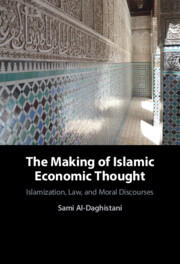Book contents
- The Making of Islamic Economic Thought
- The Making of Islamic Economic Thought
- Copyright page
- Contents
- Figures
- Acknowledgments
- Introduction
- 1 The Force of Revivalism and Islamization
- 2 The Present: Muslim Economists and the Constellation of Islamic Economics
- 3 The Past Perfect: Sharīʿa and the Intellectual History of Islamic Economic Teachings
- 4 The Appraisal: Contemporary Islamic Economics and the Entrenchment of Modernity
- 5 Pluralistic Epistemology of Islam’s Moral Economics
- Conclusion: Moral over Legal, Pluralistic over Monolithic
- Appendix
- Bibliography
- Index
3 - The Past Perfect: Sharīʿa and the Intellectual History of Islamic Economic Teachings
Published online by Cambridge University Press: 01 November 2021
- The Making of Islamic Economic Thought
- The Making of Islamic Economic Thought
- Copyright page
- Contents
- Figures
- Acknowledgments
- Introduction
- 1 The Force of Revivalism and Islamization
- 2 The Present: Muslim Economists and the Constellation of Islamic Economics
- 3 The Past Perfect: Sharīʿa and the Intellectual History of Islamic Economic Teachings
- 4 The Appraisal: Contemporary Islamic Economics and the Entrenchment of Modernity
- 5 Pluralistic Epistemology of Islam’s Moral Economics
- Conclusion: Moral over Legal, Pluralistic over Monolithic
- Appendix
- Bibliography
- Index
Summary
Chapter 3 presents the crux of the book by extrapolating works within the classical economic tradition in Islam through theological, metaphysical, and ethical ideas of major Islamic scholars, jurists, and Sufis. This chapter inquires into classical economic thought and its relation to Sharīʿa in Islamic tradition. It consists of two parts – the first deals with the moral cosmology of Sharīʿa, including maqāṣid and siyāsa, whereas the second addresses the economic thought of classical Muslim scholars. It introduces the idea of the moral cosmology of Sharīʿa in classical economic thought and analyzes economic behavior and activities, such as acqusition of wealth, production processes, division of labor, and governmental authority as ethical conceptualiztions. It also engages with the concept of Sharīʿa as an ethical category.
- Type
- Chapter
- Information
- The Making of Islamic Economic ThoughtIslamization, Law, and Moral Discourses, pp. 145 - 220Publisher: Cambridge University PressPrint publication year: 2022

